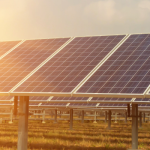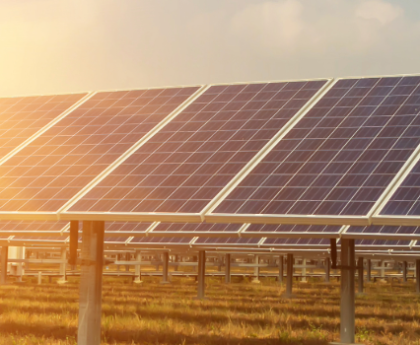Overview
- The expected financial gains seen in the study were driven largely by increased demand for residential air-conditioning as the climate warms. The other key factor affecting the value of rooftop photovoltaic systems, the researchers say, is future solar-panel performance in response to climate change.
- The increased value of solar energy being produced comes from savings on home energy costs and excess energy that is sold back to the grid. The study found that future solar-panel performance will vary from place to place across the U.S., depending on weather conditions. In cities such as Ann Arbor, Austin, Chicago, Dallas, Detroit, Houston, Louisville and Milwaukee, rising air temperatures will decrease solar panel efficiency, but reduced cloud cover will likely increase the amount of sunlight reaching panels, on average. The two factors “are opposing but roughly comparable,” meaning they cancel each other out, the researchers say.
- Public awareness of the increased future value of rooftop solar could spur greater adoption of the technology, which in turn could accelerate efforts to decarbonize the power-generation system in the United States and globally, the study shows.
- Ann Arbor and Washtenaw County offer a number of incentives and resources to residents who would like to invest in a rooftop solar array.
Transcription
David Fair: This is 89 one WEMU. And welcome to this week’s edition of Issues of the Environment. The push to carbon neutrality requires increased use of renewable energy, and a lot of the focus is on solar. The price of solar installations has been coming down, and now there’s a new study led by the University of Michigan that shows the value of rooftop solar is only going up. I’m David Fair, and our guest today served as senior author of the study. Michael Craig is assistant professor of energy systems at the U of M School for Environment and Sustainability. And thank you so much for the time today, Michael. I appreciate it.
Dr. Michael Craig: My pleasure! Thank you for having me!
David Fair: Well, some parts of the country have already been in the triple digits. We’ve certainly had some days in the upper 80s and lower 90s here. And the energy demand for air conditioning goes through the roof. Was that a primary impetus for the research?
Dr. Michael Craig: It was. We wanted to understand how different parts of climate change are affecting different parts of the economic value of rooftop solar for households. And one of those big parts is if I buy a new air conditioner or if I just run my air conditioner more, I have more demand. And that’s going to change how much my solar panels are worth to me on my rooftop.
David Fair: While it is becoming more common, a residential rooftop solar still covers just a very small percentage of homes in total. Do you know where we are right now?
Dr. Michael Craig: Well, that’s a great question. I actually don’t. I know that, across regions, there’s a huge difference in penetration. For instance, if anybody listening has been to California recently, it’s one of the world leaders in rooftop solar. Until you’ll see lots and lots of after homes with very top solar in Michigan and in places where the value is a little bit less, where there’s less supportive policies, we’re going to see less rooftops with solar. And so, it really varies depending on where you are in the country.
David Fair: I wanted to bring that up. The bureaucratic barriers–it seems there is a patchwork of ordinances and regulations as you travel through the state and the country and utilities themselves continue to throw up opposition to many pieces of rooftop solar legislation. Would there be benefits to state or national standards?
Dr. Michael Craig: Yeah, absolutely! And I think that’s something that the state and federal organizations are working on. In the industry, we call these “hard cost versus soft cost.” Hard costs are the costs of the capital involved in rooftop solar, like how much does it cost you to buy the actual panels on your roof or the mounting equipment? And so, we’ve seen, over the last 10 or 15 years, those hard costs–the cost of panels, for instance–have come radically down. And that’s been a huge driver of why it’s much cheaper to buy rooftop solar today than it was a decade ago. But then, there’s the soft costs. The soft costs are things like the cost of permitting, of labor, of all these other hoops that you have to jump through to get rooftop solar on your roof. And so, while hard costs, those panel costs have come down drastically, the soft costs have been much harder to get down. And so, they’re becoming an increasingly large percent of your total cost of rooftop solar. And so, there’s been a lot of work on trying to address those: through instant standards, with helping cities and communities adopt standard practices, so a contractor doesn’t have to look up new standards and figure out how to comply with them when they go to one neighboring town versus another. So, that’s a huge area that the federal government and states are working on right now and would make a big difference in continuing to drive those cost down.
David Fair: This is 89 one WEMU, and our Issues of the Environment conversation with Michael Craig continues. Michael is assistant professor of energy systems at the U of M School for Environment and Sustainability. Now, the study you led looked at a number of different cities around the country–17, I believe. And you were assessing future value of solar energy panels, including Ann Arbor. It seems to me the impact of residential rooftop solar, and subsequently its future value, may be different for cities here in the Midwest, as compared to those in the southwest. Is that what you found?
Dr. Michael Craig: Yeah, absolutely! So, there’s already some baseline difference in value, because if you live in a place that’s sunny, you’re going to get more electricity from your panels. And if you live in a place with more air conditioning demand for instance, you have more demand in your house, and so you get more value for every unit of electricity you generate. And so, then we layer on top how is climate change changing this situation. And so, we looked at 17 cities across the West like you said: northeast, southeast, Midwest, southwest, all over the country. And in general, across all those cities but one, we found climate change will increase the value of rooftop solar by about 10 or 15% by 2050–so, within the lifespan of a rooftop solar plant that you put in place today. And there are several reasons driving that.
David Fair: Well, what are some of those reasons?
Dr. Michael Craig: Yeah, sure. So, one big factor, like you mentioned at the top, is as I use more air conditioning, I have more demand for electricity at my house. And the best value that you can get from your rooftop solar is when you generate that electricity, you consume it at your house. If you don’t consume it at your house, what happens is it’s back onto the distribution network for your neighbors to consume, but that is just less valuable to you as a household when it comes to your energy bill at the end of the month. And so, if you have more demand for air conditioning, you’re going to consume more of that solar power in your home. And that’s going to increase the value of your solar panels.
David Fair: So, for those who put up solar panels now, what is the expected lifespan, given current technology?
Dr. Michael Craig: Yeah, it’ll be depending on weather conditions and where you are in the condition of your roof. Hopefully, it’s going to be as long as 20 or 25 years. It could be shorter or longer though, depending on different factors.
David Fair: So, if you have to replace them every two decades or so, does that drive the value down?
Dr. Michael Craig: So, we’re accounting for the lifespan in our analysis. Now, one thing that we’re not accounting for is if climate change results in a lot more extreme weather events that causes physical damage to panels, and you have to replace them more. That’s something that we’re not considering and would decrease the value. You know, if those panels are warrantied or you have insurance on them, it might not change the value to the household. And that is changing the cost of it to the installer or to the panel manufacturer. That type of physical damage–we were not able to look at in our study.
David Fair: We’re talking with U of M Assistant Professor Michael Craig on Issues of the Environment. Michael served as senior author of a study on the increasing value of residential rooftop solar. Now, you mentioned that the increase in value would be 10 to 14% or so by 2050 and, if I read this study correctly, up to 19% by the end of the century. Now, I want to take that longer view. That’s 75 years away. It doesn’t seem like a substantial increase, 19%, given the extended period of time now. No one would be surprised that my understanding of math is deeply flawed. But am I missing something? Does that seem low?
Dr. Michael Craig: No, you’re not. No, which is why I focus on within the next 20 years. I mean, thinking about 2100, that’s a long way away. Who knows how we’ll be producing and consuming power? So, I like to focus more on the 2050, because it is within the lifespan of a solar panel you could build today. But, part of the reason why we wanted to look at 2100 is a lot of the time when we think about climate change, we think in terms of purely negative outcomes. And there’s a good reason for that. There are lots and lots and lots of bad things that happen from climate change. But we also wanted to understand this is one situation where climate change is actually going to help us mitigate climate change. There’s like this negative feedback loop here. Climate change changes the weather. That makes rooftop solar a more valuable proposition for households. So, likely, more households will adopt it. And that will in turn reduce carbon emissions and mitigate climate change.
David Fair: That’s adaptation.
Dr. Michael Craig: Right, right. Exactly. So, the 19%–it’s not a large number. But I think more, qualitatively, this feedback that we have in this situation and maybe in others that we’re looking at is good news for the climate, I would say.
David Fair: As the climate warms, it’s expected that cooling demand will increase 35% by mid-century, 64% by the end of the century. That would clearly overtax the nation’s energy grid as it stands now. How much more residential and business rooftop solar do we need in order to offset that anticipated demand?
Dr. Michael Craig: Yeah. Well, we’re going to need lots of different solutions to wrestling with climate change in our power systems. Rooftop solar, whether on houses, on commercial buildings, or even on industrial buildings–that will all help and will help us meet demand at its source. And so, we don’t have to move power long distances. But there’s lots of other things that we need to do on a country and a regional basis: things like making sure our transmission system is strong enough to carry power when it’s an extreme heat wave outside. We’re probably going to need more large scale power stations, especially renewables, if we have more capacity available. And in general, I think a key strategy here is not thinking about how do I produce more power. It’s being more flexible in how we consume our power. So, thinking about harnessing to demand or response to just willingness of people to turn their air conditioners down for a brief period of time, so that we don’t always just need to think we need more and more and more and more. It’s instead how do we consume electricity more intelligently while respecting the needs and the values of the customers. And so, there’s this whole suite of solutions that I think we need in place.
David Fair: It is almost certain that 2024 will be the hottest on record–in the planet’s recorded history anyway. What might you recommend we do individually to minimize environmental impact and personal costs to accommodate our cooling needs beyond just turning down the air conditioner?
Dr. Michael Craig: Yeah. Well, I’m always hesitant to recommend individual solutions. I think that it is great if we do things individually, but the bottom line is individual actions are not going to solve climate change. We also need collective action at a higher level. But with that said, I mean, there’s lots of individual things that we can do. I think the largest effect that you can have is by changing your dietary habits, shifting away from meat, even if it’s just one meal a day. But, people have different preferences. They have different strengths associated with different habits. And so, people need to decide for themselves what they’re willing to accept and trade off here at this stage. I, for one, actually just bought an air conditioner at my home. We have a baby at home. And so, a year ago, I would have said, “I don’t need an air conditioner. It’s fine.” But, our family conditions change. We adopted an air conditioner. And now, my electricity consumption and my emissions in the summer are much higher than they were last year because we now have this new device running. And so, I think, as conditions change, people can figure out for themselves what they’re willing to take on at that point in time.
David Fair: Well, we have a journey to take together, and we’re just getting underway. Michael, thank you so much for the time and explaining the study to us. I appreciate it!
Dr. Michael Craig: Thank you very much!
David Fair: That is Michael Craig, assistant professor of energy systems at the University of Michigan School for Environment and Sustainability and senior author on how climate change will impact the value and optimal adoption of residential rooftop solar. You can find a link to the study and more information on today’s discussion on our website at wemu.org. Issues of the Environment is produced in partnership with the office of the Washtenaw County Water Resources Commissioner. You hear it every Wednesday. I’m David Fair, and this is your community NPR station, 89 one WEMU FM, Ypsilanti.
Non-commercial, fact based reporting is made possible by your financial support. Make your donation to WEMU today to keep your community NPR station thriving.
Like 89.1 WEMU on Facebook and follow us on Twitter
Contact WEMU News at 734.487.3363 or email us at [email protected]
This post was originally published on 3rd party site mentioned in the title of this site




